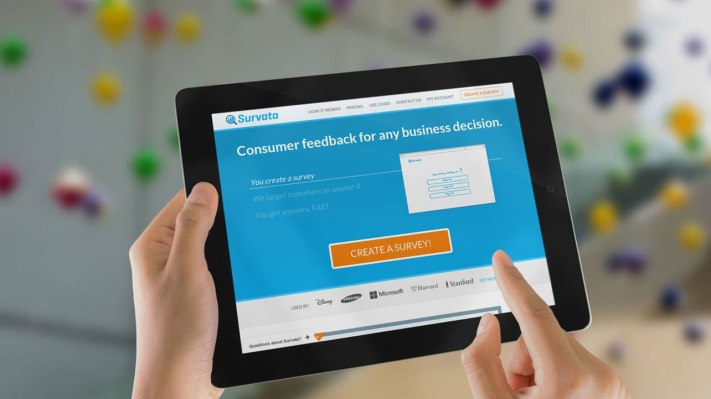Survata is a three-year-old, 10-person, San Francisco-based startup that creates consumer surveys for ad agencies, hedge funds, consumer packaged goods companies, and many others that are looking for feedback about their offerings. If Chipotle is thinking of introducing a new salsa concept, for example, Survata — which works with a network of publishers, from blogs to online magazines to video sites — will create a survey that targets the demographic from which Chipotle wants to learn.
It’s easy to appreciate the company’s appeal. It’s a channel for consumers to access content for free. (Publishers ask readers to complete surveys in lieu of paying.) It’s a cheaper, faster alternative to traditional research. To wit, Survata charges a flat rate of $1 dollar per survey response, in contrast with a company like Nielsen, whose starting costs can be around $30,000. Survata’s surveys also represent a new revenue stream for its publishing partners. Say Chipotle – a real customer – wants 500 responses about that new salsa. Survata shares the $500 it’s paid by Chipotle with its publishers.
Despite heavyweight competition from the likes of SurveyMonkey and Qualtrics, among others, investors apparently like the traction it’s gaining. This morning, the company is announcing $6 million in Series A funding led by IDG Ventures, with participation from Bloomberg Beta and numerous angel investors, including Alexis Ohanian, and Garry Tan. The company — a Y Combinator alum – has now raised $8.1 million altogether, including from earlier backers SoftTech VC and PivotNorth.
To learn more about Survata and how it helps it customers, we talked Friday with cofounder and CEO Chris Kelly. Our chat has been edited for length.
TC: You were a former McKinsey consultant. How did that job lead to Survata?
CK: I went to McKinsey out of college and was a buyer of market research and consumer research products and saw how the industry was stodgy and slow and expensive. Then I went to Matrix Partners for a couple of years as an associate, and that was also helpful in seeing the need for this business. The investors would be curious to hear whether there was demand for a particular new product and [I realized that something like Survata] would let them quickly poll potential users.
TC: When you decided to launch, you entered Y Combinator. What did you get out of that experience?
CK: We needed to stay laser-focused on our core model, as there are a lot of things we could have gotten distracted with. We thought maybe we could upsell people to other research services, or white label the technology to publishers so they could sell their own surveys. But we realized it wasn’t worth any of those things, that we really needed clients to pay us money. Y Combinator helped us focus on our core model and not ancillary models.
TC: You have some big customers, including Clorox, that probably use you a lot. Why choose a pay-as-you-go model versus charge them a subscription?
One of our investors, Roy Bahat of Bloomberg Beta, calls it a “legible” model [because it’s so straightforward]. Our clients don’t want to have to pay a SaaS fee for something they may not use; they want to pay only when they use us.
But it is a very habit-forming product. We have one product development consultant who has now used us dozens of time. We also have clients who are on monthly trackers or running quarterly surveys, where they are paying us for same survey every month to see how the results change. So our transactional model does lead to a lot of repeat usage.
TC: Obviously, the efficacy of these surveys is crucial. How do you guarantee you’re getting good results for your customers?
There’s an art to creating surveys and it’s one of the primary reasons that we have a survey analyst on staff. There are a lot of things to know and understand about revealed versus stated preferences, for example. There are certain topics that we advise clients to be careful about. Say you’re asking people for pricing. You don’t ask what you’d pay. A methodological trick would be to ask what you think others would pay, or what you think a product would cost on the shelf. You don’t want to ask people, “Would you use this product, yes or no?” You have to take other paths, including asking what problem a product would solve, or who do you think would use the product. There are many shortcomings to many types of surveys, and you have to know what they are good for and when to recommend that people not ask questions a certain way. We have enough experience at this point to do that very well.
Source: here
